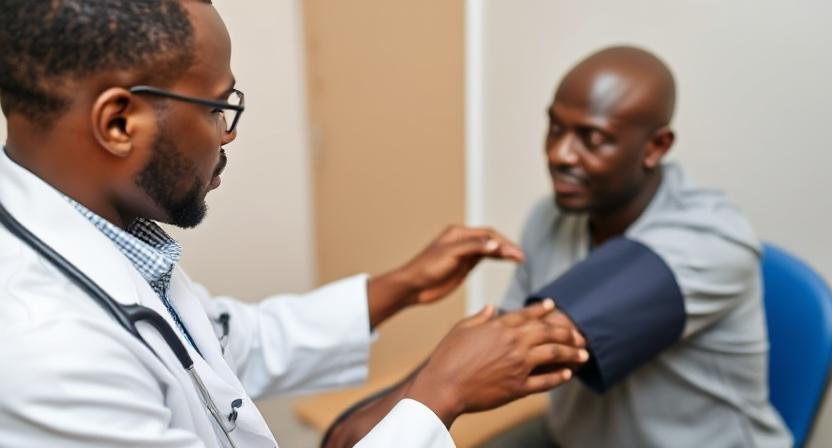Mr Ambrose was at home after a busy day at his mechanics’ workshop. He had just sat down to have his meal of Eba and Egwusi soup that Mama Favour had prepared for him when he felt his right hand was a little numb.
He quickly stretched it out and massaged his forearm thinking of the long time it took for him to unscrew the top cylinder he had worked on that day.

As he raised his arm to wash his hands in the bowl eight-year-old Favour had presented, he found himself unable to lift his hand and felt a strange sense of dizziness. That was the last he remembered.
Mr Ambrose slumped and fell off the chair sending his soup and water flying all over the floor and nearby walls. As Mama Favour screamed for help neighbours rushed into their flat to find him unconscious on the floor.
” Holy Ghost fire”, Sister Chi screamed as she saw Mr Ambrose apparently unconscious on the floor. As the crowd gathered, Mama Favour kept screaming as some administered anointing oil , others were praying and speaking in tongues while Mr Ambrose was rushed into Brother Martin’s car.
Favour and her three siblings watched on, confused while their newborn, Samuel, who was on their mothers back, started also to cry. There was a short argument about where Brother Martin was to take him. Sister Chi insisted they proceed immediately to the prayer house of her pastor where she had arranged a retinue of prayer warriors to chase the demon out of Mr Ambrose.
However, Brother Martin whose wife was a nurse insisted: “This is not a matter for Prayer House Sister Chi!” Mr Ambrose arrived at the General Hospital where he was later stabilised, his admitting blood pressure was 220/115mmHg.
The doctors immediately sent him for a scan of his brain. Mr Ambrose had had a stroke, a bleed in his brain and the doctors were scared he would not make it. As he struggled for his life for the first week, the doctors explained that he had likely been hypertensive for a long time but not diagnosed because he had signs that his body had been dealing with hypertension for long.
Mr Ambrose slowly became aware of his environment and by day seven, Mama Favour was able to explain to him all that had transpired since he collapsed while having his dinner. About one week into his hospital stay, the doctors came round for a ward, the residents gave a history summarising his case to the consultant and he heard them discussing his case.
The young doctor asked him to raise his right hand, and he struggled with no success. Even to move his fingers was an impossible task. His right arm felt like a dead weight, and same with his right leg. As tears trickled down his face, the doctors interrupted their discourse to ask Mama Favour, “why is he crying?”.
He continued to weep as he saw his future crumbling before his eyes. How would he fend for his young family without his right arm and leg. Was he to end up back in the village with his unskilled and less fortunate brothers who depended on him for their daily bread? His wife tried to explain to the doctors his fears while he continued to weep. What did he do to deserve such a fate?
The doctors tried to explain that his stroke was likely due to hypertension which he had probably had for many years without knowing. Unfortunately, Mr Ambrose had never had his blood pressure checked.
He prided himself on his good health and had rarely need to visit the local chemist in his neigbourhood. Apart from one or two yearly bouts of malaria which Emeka the chemist was quick to handle, he was mostly a healthy and strong man who never took a day off work.
Mr Ambrose is not alone, Studies show that although about one in three Nigerians are hypertensive, only 30% of them are aware of their condition with about 12% on treatment for this condition. For those on treatment, only about 3% were well controlled (Adeloye et al, PMID 33600078).
Yet hypertension is the leading cause of cardiovascular diseases like stroke, heart and kidney disease. Studies in Nigeria and Ghana have shown that majority of our risks for strokes are due to hypertension and about 91% of strokes can be prevented just by blood pressure control(SIREN study). Yet, majority of Nigerians are not even aware of their blood pressure and the need to have it checked.
Hypertension is termed a silent killer because most times it has no symptoms unless it has now led to complications like heart failure, kidney disease, or stroke.
Many Nigerians believe that headaches are a symptom of hypertension without realising that even for severely elevated blood pressure, only 20% of them will have headaches.
For the majority of people with mild to moderate hypertension, there will be NO SYMPTOMS: no headache, no dizziness, no chest pain, nothing, just silent damage
One out of four people will have a stroke during their lifetime and most of these strokes can be prevented. Strokes in Nigeria occur in younger age groups and thus tend to strike when men are still raising their families and leading to great economic burden and loss of income to the family.
Stroke has a high mortality and for those who survive, six out of 10 people live with permanent disability. Mr Ambrose was left with a permanent right sided weakness and wheelchair bound after his stroke at the age of 42. He lost his ability to provide for his family, he lost his income and most importantly stroke robbed him of his self-worth and identity as the breadwinner.
The economic burden of stroke on households, health systems and economies is significant. A study done in Ibadan in 2024 showed that total cost of stroke care in a tertiary centre in Ibadan was about N196,000.00 per patient of which 94% paid out of pocket.
This relates more to direct costs like out-of-pocket expenses for hospital admission, imaging, medication and physiotherapy.
The indirect costs however are even more alarming, loss of paid work from disability or death, cost of time and effort by family and caregivers and nonmedical costs like transportation.
Strokes also place a great burden on healthcare facilities especially in a country with limited resources like ours.
On the flip side, hypertension control is much less expensive than cost of treating stroke. Average cost of managing hypertension is about N3,400.00 monthly while the cost of acute stroke care is about N196,000.00 in direct medical costs.
This cost does not factor in the social and health care costs after the stroke event. For many, strokes can be catastrophic due to loss of income and may lead to financial ruin.
The good news is that strokes are largely preventable. Just by controlling blood pressure alone, about 91% of strokes can be prevented (SIREN study PMID).
The first step in ensuring that you are not one of the victims of stroke is to KNOW YOUR NUMBERS which a campaign is propagated by the World Hypertension Society. A healthy blood pressure is one which is less than 120/80 mmHg although the current definition of hypertension is one above 140/90 mmHg. The consensus is that for blood pressure, the lower the better.
For many who have been diagnosed with hypertension, many miss their medications, take drug holidays or are not well controlled on their blood pressure medications.
The practice of taking blood pressure medications irregularly or “I know when my BP is high, I get headache and then I take my BP medicine” should be discouraged.
Blood pressure medications should be taken regularly and at the same time of the day every day. It is also wise to have a home blood pressure monitor to check your blood pressure at least 1-2 times a week.
Once diagnosed with hypertension, regular checkups with your general practitioner should be encouraged as this will ensure that the medication is working well as sometimes the medications need to be adjusted. Many complain of the inconvenience of taking a pill every day for their blood pressure.
As I often tell my patients when they complain, “which would you prefer, taking a small pill every day or living the rest of your life in a wheelchair?”
On a broader community level, the government should conduct more screening in the population and ensure that people get their blood pressure checked at least once a year.
Government should make yearly health screening (including blood pressure assessment) compulsory for government workers, private sector, artisans and the community at large.
READ ALSO: Rethinking Nigeria’s democracy from marginalisation to nationhood, By Ayodele Adio
Majority of the population work in private sectors or are self-employed and attention should be paid to their health needs. Health clinics at every market should be compulsory and perhaps on weekly environmental days where shops are forced to close and clean their environs, blood pressure assessment can be introduced as mandatory.
Medications should also be cheap and accessible to all, possibly even free for low-income earners. All these measures will go far to reduce the risk of stroke and other cardiovascular diseases associated with hypertension.
When last did you have your blood pressure checked?
Nkechi Obianozie, a Consultant Neurologist, is Fellow of the West African College of Physicians (FWACP)
Read the full article here


